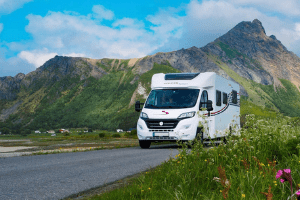Leisure batteries play a key role in making your motorhome comfortable for driving and residing whilst you’re on the road. You may be new to the world of motorhome batteries and are looking to brush up on your knowledge before heading on that long-awaited road trip.
This guide will explain what a motorhome leisure battery is used for, the different types of leisure batteries, and how to perform regular checks and maintenance on them.
What are leisure batteries used for?
A leisure battery is designed to deliver power to 12V appliances throughout your motorhome. Producing a steady, prolonged flow of electricity, leisure batteries help to power your kettle, TV, oven, and lighting in your camper, amongst other devices.
Leisure batteries are different to car batteries. When starting the engine, a car battery delivers a burst of energy. Car batteries are designed with thin plates and separators that are not equipped to source power for lengthy periods. Alternatively, assuming they are taken care of, leisure batteries consistently release low levels of energy to power your electrical equipment for up to four to five years.
Different types of leisure batteries
Knowing how to choose a leisure battery is dependent on its specific purpose and how often you use your motorhome. There are three main types of campervan battery, with the most common being lead-acid batteries. We’ve listed them below:
Open lead-acid battery
The least expensive option, also known as flooded batteries, this leisure battery operates with simple technology and is easy to maintain. Primarily for camping or weekend getaways, a motorhome owner would benefit from this battery type if they occasionally use their camper.
This battery safely discharges to 50%, and you can choose to recharge it when necessary. For maximum, safe performance, top up regularly with electrolyte to ensure the top of its lead plates aren’t exposed. If they are exposed this can cause damage to the battery.
Sealed lead-acid battery
A popular option for motorhomes, this battery is maintenance-free and sealed, so there’s no need for any regular top-ups for it to stay in mint condition. It’s recommended for those who don’t mind spending a little more on their leisure battery, and you can rest assured that it safely discharges to 50% whilst remaining in good working order.
Standard leisure batteries
Also referred to as deep cycling or auxiliary batteries, standard leisure batteries consistently provide a fixed power supply over long periods of time, delivering power to your appliances when you need it most. Excellent for a motorhome.
How to maintain your leisure battery
Ensuring your leisure battery stays healthy is important, especially when your motorhome isn’t in use. Here’s a few top tips on how to maintain it:
Apply grease to the terminals
Consistently charging your battery will result in both hydrogen and oxygen releasing from it. Sulphur is found in these gases, which is known to react with the metal of the battery terminals. Covering the terminals with either grease or Vaseline will help to prevent any damage.
Keep it charged
If your battery is left uncharged whilst your motorhome is locked away for long periods, it may stop working altogether. This is because sulphation will build up on the battery plates, causing damage to the entire unit. Be sure to leave your leisure battery in a charged condition, even when it’s not in use.
Use the correct connectors
Using connectors that don’t fit your leisure battery can lead to bad performance, as well as potentially causing corrosion of the battery itself. By using the correct terminal connectors for your battery type, this will guarantee a proper connection between both the battery terminal and the connector, delivering maximum performance.
Check the gas breather pipe
The gas breather pipe helps to vent any harmful gases away from the enclosed space in which the battery is located. Ensure the gas breather pipe is fitted securely and connected correctly, and don’t forget to check this regularly.
Check electrolyte levels
Ensure that the electrolyte level fully covers your battery’s lead plates. If it doesn’t, make sure to top this up with deionised water until you meet a suitable level. For peace of mind when checking your battery, it’s important to wear safety equipment during inspection.
How to check and charge your leisure battery
Your motorhome may display an indicator light to show your battery’s charge level, however, this is not always accurate. It’s worth purchasing a hand-held meter to gain a more precise reading so you know when to charge your motorhome leisure battery.
It’s important to note that before using a meter to check the charge level of your battery, you should do the following:
- Switch off all electronic appliances in your camper for the most accurate reading
- Do not drive your motorhome right before checking your battery. If it’s been recently used, it will produce a higher reading
- When disconnecting the battery, always remove the negative terminal first
- Do not smoke near the battery
There are a few ways to charge a leisure battery depending on the type you have. We’ve listed the main charging methods to assist with your campervan battery:
- Split charge relay: This involves connecting the leisure battery charging circuit to the engine-driven alternator. That way, when you turn on your motorhome’s engine, the battery will automatically charge.
- Battery to battery smart relay: With modern emission regulations causing restrictions to a vehicle’s alternator, some motorhomes now use smart alternators, which reduce the charging voltage once the battery is fully recharged. The starter battery connects to the leisure battery, and the smart alternator provides full charge voltage for both.
- Solar panels: These can be used to generate electricity to charge leisure batteries. However, they should not be used as the primary source as power isn’t consistently guaranteed, due to varying light and weather conditions.
Specialist leisure batteries
There are a few alternatives to the main leisure battery types, which include the following:
Gel batteries
Imported motorhomes may be fitted with a gel battery over a lead-acid battery for extra safety in the event of a crash. This is because this type of battery features non-spill electrolytes in the form of a gel, and the casing is completely sealed.
Absorbent Glass Mat (AGM) batteries
AGM batteries can function as both leisure and starter batteries. This battery has lead plates in each cell, with a highly compressed glass fibre in each compartment. This fibre is used to absorb any acid electrolyte and delivers a longer-lasting working condition.
Lithium batteries
Motorhome lithium leisure batteries deliver double the energy density of a regular battery and are incredibly lightweight. Lasting 10 times longer than standard lead-acid batteries, a lithium battery can safely discharge to 80%.
Providing consistent performance whilst you’re out and about in your motorhome, this type of battery can withstand cold temperatures and offers longevity, meaning you won’t have to worry about replacing your lithium leisure battery for your campervan anytime soon.
Protect your motorhome with Comfort Insurance
We have over 30 years’ experience providing protection cover for motorhomes and campervans. If you’re struggling to find a policy that’s right for you, please don’t hesitate to contact our friendly team by calling 0208 984 0666 or emailing info@comfort-insurance.co.uk.







